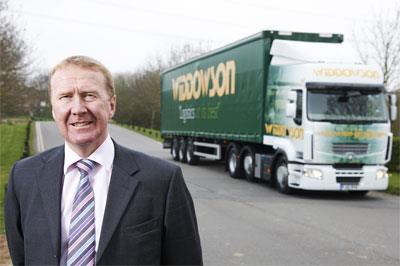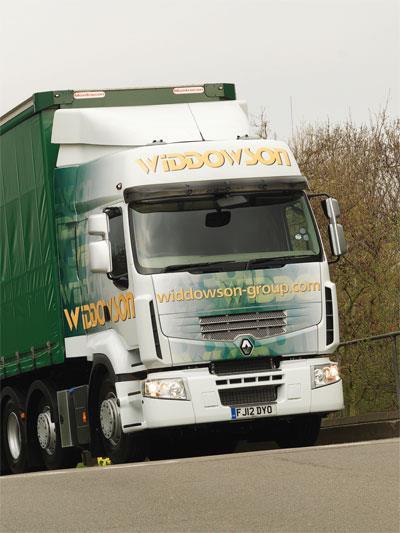
In April, Leicester-based Widdowson achieved a significant milestone: it became the first third party selected by Waitrose to be the supermarket chain’s official logistics partner in the Midlands. Waitrose has previously nominated carriers only to assist with distribution in the North and South.
The move demonstrates how far the operator has come since it started life as a coal merchant in the early 1900s – it is registered as AM Widdowson, which stands for Ada Mary, the wife of the original Mr Widdowson. Today, it has 120 vehicles, 200 trailers and 550,000ft2 of warehousing at three locations in Leicestershire – Glenfield, Bardon and Wembley Road.
At an operational level, Widdowson is split into six divisions: warehousing; contract packing; transport; freight forwarding; pallet repair; and garage services. This is part of the firm’s strategy to hit a turnover of £30m by 2013, says commercial director John Hawksworth.
“We try and look at how much of a service we give to a customer,” he says. “Our ideal customer is someone who will require our freight division to handle the product coming into the country – and out again. Someone who wants us to store it in this country and then wants us to add value to it in storage, be it rework, contract packing or re-labelling. And someone who wants that product to be distributed. They are the four key service offerings that we give to clients.”
Repackaging
Packaging has been a core market for growth in recent years. It grew out of its warehousing division and the company now offers clients such as Boots repackaging for its Christmas gift sets. It was a simple path for expansion that came from clients asking to do something to products before they came out of warehousing. “It was as simple as delivering to Argos and putting the catalogue number on the box,” says Hawksworth. “We had a corner of the warehouse allocated to doing some value-added operation. Out of that was born a concept of instead of doing it at each location, why not do it properly?”
Widdowson has now converted 50,000ft2 of warehousing at its Glenfield site for contract packing. “It was a case of offering what customers want from us, instead of running a full pallet in, full pallet out operation.”
But boxes do not pack themselves, and they do not have steady volumes. Therefore, Widdowson has to employ agency labour for the peaks, in much the same way an operator does in a transport and warehousing capacity. Hawksworth is predicting peaks for Euro 2012 and the Olympic Games, when several customers have major promotional activities.
Diversification
The cumulative effect is to set Widdowson apart from the competition. “When we set this up we said we wanted to gear ourselves up and diversify from just running trucks and warehouses, so we looked at what we could offer. We needed the professional facilities to offer out to the clients,” says Hawksworth.
Diversifying the Widdowson business came from its partnership with pallet manufacturer IPP Logipal. In 2009, IPP Logipal needed to set up a substantial pallet depot in Leicester – after signing with a local snack company – to inspect, repair, store and distribute its pallets. Widdowson offered to handle the volume of pallets – the physical pallet itself – and now processes 60,000 pallets a week. “There are huge stacks of pallets out there and we bring them into the warehouse operation, pick them up with lifts and inspect the pallets so they fit all of IPP’s criteria. Then they go through a repair and painting process.”
Not that the transport and warehousing operation should be belittled. It is core to what Widdowson does on a day-to-day basis.
The company runs a fleet of mainly Scanias, with five Ivecos, and is taking on 26 Renaults this year. The decision to take on Renault came as part of the fleet replacement programme: Widdowson has extended the life of its fleet over the recession from five to seven years.
With maintenance and fuel costs rising on the older fleet, the fuel savings on the new vehicles outweighed the savings made on the lease costs of the older vehicles. As fuel makes up more than 40% of its fleet operating cost – the biggest consideration – it decided to go for newer vehicles.
Widdowson worked with dealership RH Commercials, which gave Widdowson a vehicle to test for 11 months. Hawksworth says RH Commercials met all Widdowson’s expectations on costs. “We made our decision based on our requirements for 2012,” says Hawksworth. “A project for the latter part of this year is what to do in 2013 and we will be challenging all the manufacturers to come up with solutions for what we are looking for.
“We are being challenged by our customers, and everyone wants more for less. That is what the recession has taught us. We are having to challenge our suppliers in the same way.”
Hawksworth says margin retention is not just down to one factor. It is a combination of addressing the smaller elements of the business for the good of the greater whole. “It is down to how the planners plan and how the work fits. There is more to think about than there was 10 years ago.”
Equally, he believes that IT is the single biggest component that wins or loses customers because customers want information. All customers are looking for web-based systems, the stereotypical and ubiquitous ‘real-time solutions’, and Widdowson has to deliver to maintain its customer relationships.

Hawksworth says IT can also help Widdowson, which works with RoadTech and Masternaut among others, smooth out its systems to make the company more efficient. It is monitoring fuel, drivers, driving styles, mpg, time spent on site – you name it, Widdowson is keen to track it to keep the company on top of its game. Nor is all this monitoring detering employees. Hawksworth says not one driver has left the firm this year, despite the employment opportunities available in the ‘golden triangle’.
New business
And with Widdowson winning new contracts such as the Waitrose one, that situation is not expected to change. So how does Hawksworth target new business wins?
“We have to ask does it fit with what we are doing at the moment? Are there synergies that mean we don’t have to go out and get any more vehicles? Can we move stuff off days and onto nights to give us better utilisation of the fleet? We go through the exercises to look at the fleet and how we can sweat the asset. And we also talk to our partners. We have partnership arrangements with other companies as well that we share work with,” he says. Widdowson partners Elddis Transport in the North and Lenham in the South.
Customer focus
Hawksworth says he is not in the business of taking on contracts that involve full TUPE transfers or quick expansions of its fleet. Instead, the focus is on key customers and those that can be folded into existing operations. These include Office Depot, with which Widdowson signed not just a contract extension but also an expansion of that contract in April. Now it conducts further overnight trunking work and container services – including unloading containers from the Far East, breaking the content down into palletable deliveries and then transporting them to Office Depot distribution centres in Ashton, Leicester and Ireland.
Another contract signed earlier this year was with Magimix and Widdowson is now responsible for storing, handling and distributing the company’s high-end kitchen appliance range, including food processors and Nespresso coffee machines. “Magimix is a client that uses our warehouses, contract packing, distribution and freight forwarding divisions. It is an ideal client that uses all our services,” he says.
Widdowson is fortunate. In the current environment, building a partnership between operator and customer has proved difficult – but not impossible – as many look to cut costs and get the cheapest rates. Hawksworth says he is always being challenged by his customer base about “what else [Widdowson] can do for us?” but not necessarily “what else can you do for us at an extra cost?”.
“I see things are going to continue to be difficult but a lot of companies have learnt lessons through the recession. We have, when looking at things like cost control and what we do and why we do it. We’ve all been through the ‘is it right for us?’ decisions,” he says. “There are lots of people out there looking to see what they can do to save more money in their supply chains. There are always opportunities.”














